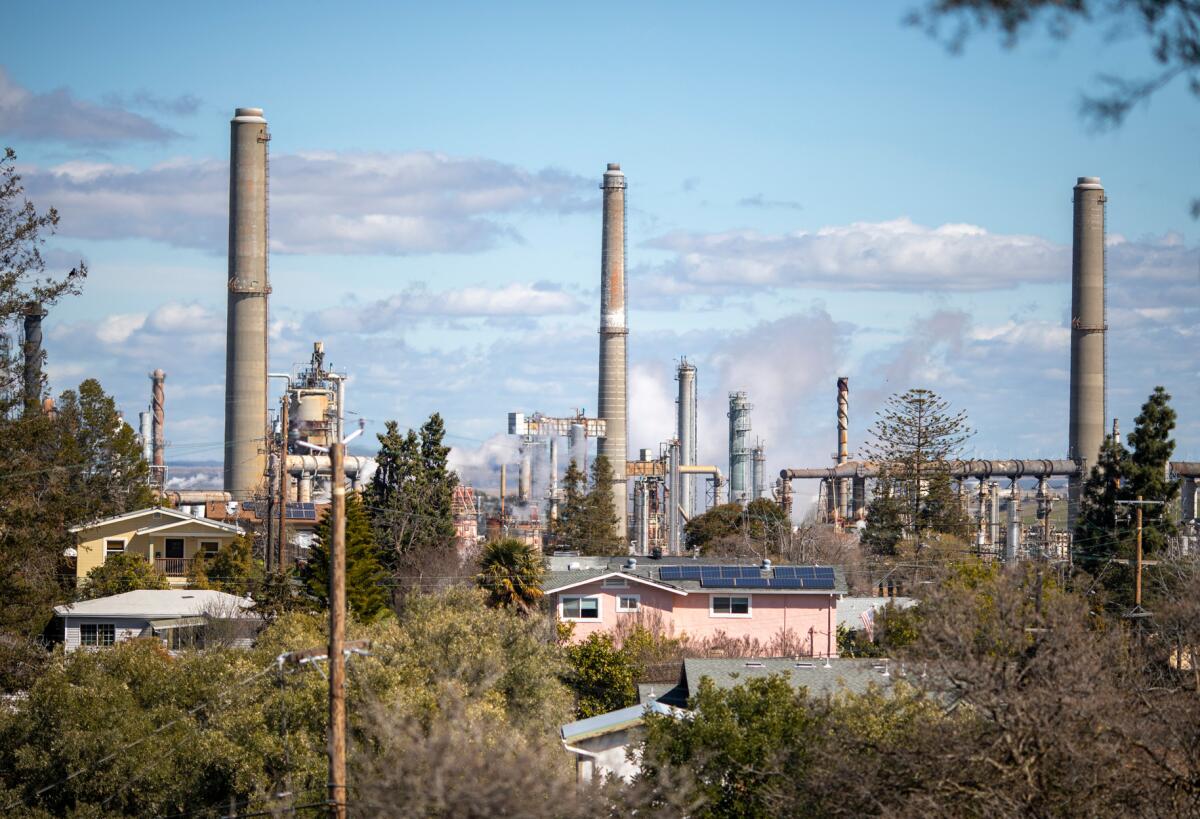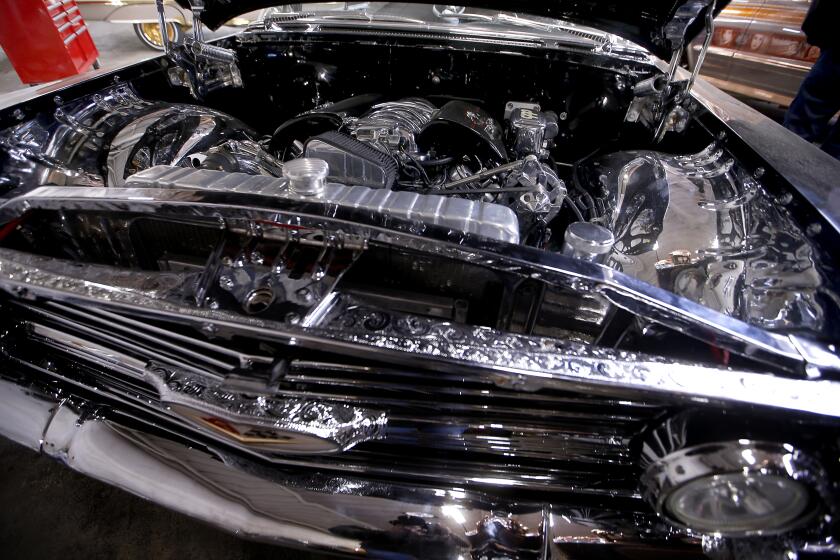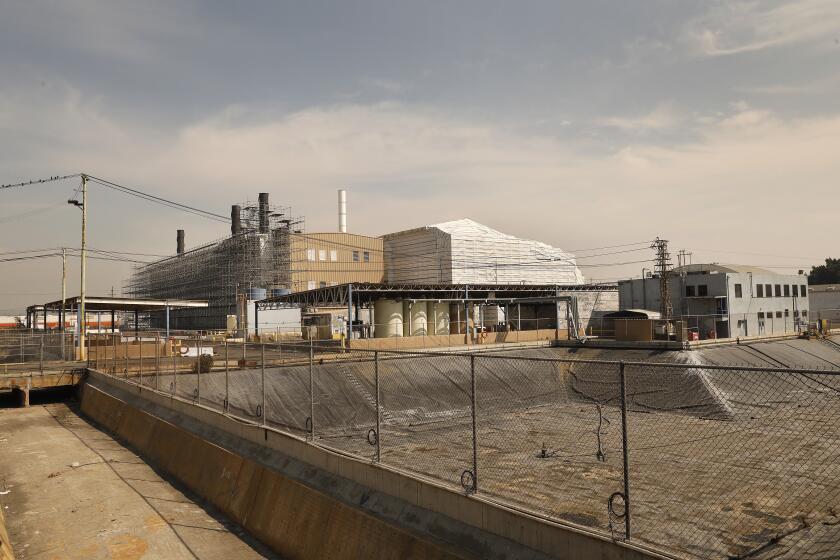FBI investigating hazardous fallout from Bay Area refinery

- Share via
The FBI and the U.S. Environmental Protection Agency have opened a joint investigation into the release of hazardous materials from a Bay Area oil refinery — an incident that has sparked heated criticism of the facility’s owner as well as local government officials.
FBI agents and EPA Region 9 staff have been going door to door in the city of Martinez, asking residents for details about the release of metal-laden dust from the Martinez Refining Co. over the Thanksgiving holiday last year.
An FBI spokesperson confirmed Friday that the agents were canvassing residents as part of a joint investigation, but referred all other inquiries to the EPA.
“EPA is communicating with local, state, and federal agencies and does not comment on any ongoing investigations,” said Michael Brogan, a spokesperson for EPA Region 9.
California air regulators have voted to phase out the use of a highly toxic metal that’s commonly used to restore classic cars and protect aviation parts.
Martinez Refining, located on an 880-acre industrial complex on the northern edge of the city, emitted as much as 24 tons of so-called spent catalyst, a mix of chemicals used to break down crude oil into finished petroleum products like gasoline, according to the local air district.
The fallout left cars, homes and at least one school blanketed in a white powdery substance. Tests determined that the residue contained metals such as aluminum, barium, chromium, nickel, vanadium and zinc.
Martinez Refining did not immediately inform county officials about the chemical release as required by law, according to Contra Costa County Health Services. The local air district and county officials learned after receiving complaints from residents.
The health department said the most significant health risks were short-term respiratory problems from breathing in the metals in the hours after the release. But it later advised community members not to eat foods grown in the soil if their homes were dusted by the spent catalyst.
The entry of federal investigators has stunned Martinez residents who are still awaiting the county-ordered soil testing and investigations by other local agencies.
“We kind of expected quiet investigations in the background. But to have the FBI come out, that was never on our radar at all,” said one Martinez resident who spoke with federal investigators and asked to remain anonymous out of fear of retaliation.
PBF Energy, the parent company of Martinez Refining, said it was aware of the Department of Justice investigation, but declined to comment on the ongoing federal inquiry.
“We are cooperating with all relevant agencies, including with respect to any ongoing investigations related to the incident,” said Brandon Matson, spokesperson for PBF Energy. “We would, however, like to take this opportunity to once again apologize to the Martinez community for the spent catalyst release on November 24, 2022.”
The county health department has referred two violations to the Contra Costa County district attorney’s office — one for failure to notify the proper authorities of a hazardous material release and one for illicit discharges into the county stormwater system. Both referrals remain under review.
California’s budget proposal commits $67 million to clean thousands of lead-contaminated parkways near the former Exide battery smelter.
TRC Companies Inc., a county-hired engineering firm, is investigating potential health concerns associated with the release. Connecticut-based TRC has taken soil samples from 14 locations across Martinez and in the neighboring communities of Benicia and El Sobrante.
At the behest of federal investigators, neighbors have been circulating a survey about the incident.
Heidi Taylor, whose family moved to Martinez in August, said the survey asked for details about their observations of the refinery dust and if residents have experienced health issues.
Taylor said her family first noticed the spent catalyst outside their home the day after Thanksgiving. Her son and husband were preparing to give away an antique dresser to a neighbor.
The dresser, which sat outside overnight, was covered with a chalky, white dust that the family thought might have been soot from wood burning. Unaware of any health risks, her son wiped his hand across the top of the furniture, sending the dust airborne, an episode that continues to deeply trouble Taylor.
“That memory is just seared into my brain and it freaks me out,” said Taylor. “I understand that may sound a little crazy ...but people don’t understand what it’s like to live in this constant fear and anxiety of not knowing what these toxic metals will do.”
Before learning about the county’s advice on food, Taylor had also eaten homemade applesauce from apples on a backyard tree and drank tea with peppermint picked from their herb garden.
She said she welcomes added scrutiny from federal investigators.
“We know our D.A. is pursuing criminal charges, but we’ve been told that’s going to be months down the road. So, to see the feds show up, oh my God! Hallelujah!”









